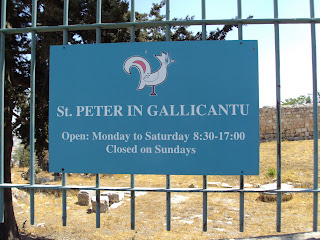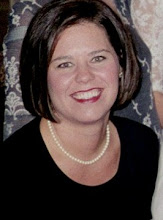Today was a painful day, mostly because I just didn't feel well when I got up - stiff, sore, lethargic - I suppose a day in the desert really does "take it out of you." So today's walking and another dry lecture didn't really help the cause. Conversations with my pilgrim friends about iced tea, massages, pedicures, and other comforts of home became signs that we're beginning to long for home.
While I have taken with a grain of salt much of the lore that has been shared with us at each of the sites we have visited, today required more salt than usual, as we visited two different locations of the Upper Room, the site of The Last Supper. Our first stop was at St. Mark's - a Syrian Orthodox convent, claiming to be the first Christian church. We listened to a VERY animated nun named Justina, who told fascinating tales and even sang to us in various languages. Their version of the upper room was actually a "lower" one - below ground as if in a basement, underneath their small sanctuary. As with many ancient/archaeological sites, later generations have built on top of older remains, so to get to the "upper" room we had to go down. We weren't allowed to use our cameras inside, so here are a couple pics from the outside...
We then visited a second possible location of the Last Supper - which felt almost like a walk way/pass thru. Here's one of the two identical doors through which we passed:
Views inside the room:
After lunch at another monastery/hostel type place (sorry - I'm not on my A game today - didn't write down the name and didn't take any photos, but I recall there being a Lutheran connection...), we visited St. Peter in Gallicantu, the location of Caiaphus' house, where Christ was imprisoned.
Actually, this was a pretty powerful site to behold. In the photo above you can see how the church is built on top of the ruins, and on the back side are ruins of the steps leading down into the prison cells, as you can see in these photos:
We spent some time in quiet reflection at this location, walking through the ruins. I'm sure it's by design that there was an actual rooster crowing close by, but powerful nonetheless. Some of the places we have visited required much imagination to picture the events claimed to have happened, but not so here. There were many spots here where Peter could have been warming himself by a fire, and the rocky ruins were unmistakably those of a prison.
We were back at the college by 3:30, and Caitlin and I crashed, taking long, dream-laden naps until dinner time. Tonight's lecture was given by Xavier, a Communications Advisor for the PLO. Our lecture was nearly an hour late getting started because of the hold up at a check point... a typical event for most Palestinians.
Xavier gave a well organized power point presentation, outlining the Palestinian requirements for negotiations:
1. Statehood with control of their own borders and air space.
2. Israeli withdrawal from East Jerusalem - no solution that deprives them of Jerusalem will be accepted.
3. Rights for refugees - rights of return, restitution, and compensation.
He also gave us some basic statistics:
*There are 1.5 million refugees living in Gaza, 90% of them living on international aid.
*The Palestinian Authority controls less than 3% of the land.
*There are over 120 settlements in Palestinian areas. And it's not just about houses - also the infrastructure that consolidates them into the Israeli structure.
*86% of the wall being built is built on Palestinian land, almost double of what the Green line designates.
*Roads built, connecting settlements to Israel are built on Palestinian lands, but Palestinians are not allowed to use them.
*The Israeli government gives financial incentives to motivate people to move to settlements, and the current Israeli Foreign Minister is a settler in Bethlehem.
It is not a stretch for me to believe the things he told us about the impact of the Wall and checkpoints on the Palestinian economy, since I've seen the difficulties of movement with my own eyes. 35% of their economy is tourism - Christians coming to the Holy Land for pilgrimage - but with over 600 checkpoints, it's nearly impossible for Palestinians to move goods or provide services. He said that Israel even controls what kind of food aid can be transported into Gaza - like allowing rice to be brought in but not pasta - which increases the feelings of oppression. Xavier also told us heart wrenching stories about couples living in different towns wanting to get married, but can't live together because neither can get a permit to live in the other's town.
The state of Israel is indeed complicated, but I agree that building in settlements must stop so that conditions for establishing trust and resuming negotiations can emerge. Balance of political realities and international law is certainly needed...
After Xavier's presentation, a group of us went over to the cathedral's pilgrim guesthouse for drinks and conversation - it was a very cool evening, requiring a sweater to sit outside. Blessed relief from the heat, especially since the air conditioning at the college quit working.


















No comments:
Post a Comment